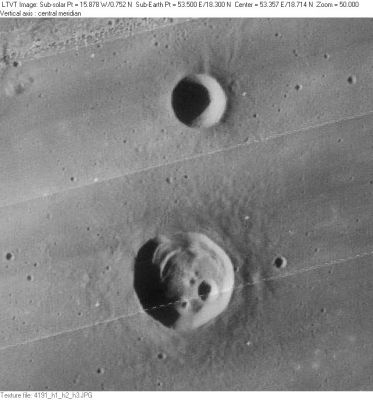Swift
Swift (north of the larger Peirce, in the W part of Mare Crisium)
(formerly Peirce B)
|
Lat: 19.3°N, Long: 53.4°E, Diam: 10 km, Depth: 2.04 km, Rükl: 26 |
LO-IV-191H Swift is at the top with the larger crater Peirce below it.
Images
LPOD Photo Gallery Lunar Orbiter Images Apollo Images
Maps
(LAC zone 44D4) LAC map Geologic map LTO map
IAU page: Swift
Description
Description: Wikipedia
Additional Information
- Depth data from Kurt Fisher database
- Westfall, 2000: 2.04 km
- Viscardy, 1985: 1.86 km
Appearances of mist at Swift? (possible TLP, Transient Lunar Phenomena)
- Swift can evidently be difficult to recognize at high sun, so this crater, like Linné, has been the center of debate regarding variability on the Moon. In his 1953 Guide to the Moon (pp. 102-103) Patrick Moore says the theory of obscuration by mists
- ... is supported by dozens of independent observations of mists in the area. These observations go back eighty years to the time of Birt, who often noted that Graham [proposed name for Swift], the crater south [this should read "north"] of Peirce, was totally invisible when it should have been obvious. This has also been found more recently for instance, Dr. Wilkins could see no trace of it on May 12 1927, though it had been normal on May 11 and had reappeared faintly by May 13. Three times in 1948 the writer saw the whole area "misty grey and devoid of detail", with the surrounding surface sharp and clear-cut...
Nomenclature
- Named for Lewis Swift (1820-1913), an American astronomer.
- This replacement name for a formerly lettered crater was introduced on LTO-44D4 (October 1974), where it is listed as "approved by the IAU".
- The name was approved "as assigned" in IAU Transactions XVIB (1976).
- Before it had its present name, Wilkins and Moore proposed naming this crater Graham after a 19th century English astronomer. The I.A.U. did not accept that name.
LPOD Articles
Bibliography
Lewis Swift in the Sourcebook Project (William R. Corliss)
In: Rare Halos, Mirages, Anomalous Rainbows, and related electromagnetic phenomena (1984) :
- Phenomenon Yet Unexplained (Popular Astronomy, 1898) (Color Phenomena and the Earth's Shadow on the Sky)
In: Mysterious Universe; a handbook of astronomical anomalies (1979) :
- Supposed Discovery of Vulcan (Observatory, 1878)
- Bailey's Beads (Sidereal Messenger, 1890)
- The Colored Lunar Band (Popular Astronomy, 1896) (Lunar Eclipse Phenomena)
- Black Transit of Jupiter's Third Satellite (Sidereal Messenger, 1890)
- Note from Dr. L. Swift (Astronomical Journal, 1896) (enigmatic object)
